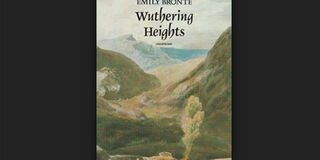Lessons from this classic still apply in modern world

If there is a book that is timeless, then Emily Bronte’s Wuthering Heights is it. PHOTO| COURTESY
What you need to know:
- We despise rude people, arrogant persons, leaders in the other camp, our institutions, the other tribe, our polity and just about anything that seems to stand in our way of growth.
- Seen how we (young and old) enjoy video games? Especially the violent ones where we vaporise — with machine gun fire — that which comes at us?
No book captures the universality of man’s vengefulness than this particular Victorian novella.
If there is a book that is timeless, then Emily Bronte’s Wuthering Heights is it.
The dislike for one another, the waiting until that opportune moment that it becomes optimal to hit back, the calculations, the threats and the supposed sweet revenge (even in death) that turns out to be misplaced elation and imagined victory is all very much alive in society today.
We despise rude people, arrogant persons, leaders in the other camp, our institutions, the other tribe, our polity and just about anything that seems to stand in our way of growth.
Seen how we (young and old) enjoy video games? Especially the violent ones where we vaporise — with machine gun fire — that which comes at us?
No book captures the universality of man’s vengefulness than this particular Victorian novella.
The we-versus-them or the me and them way of living.
The book, which took the author just under 12 months to pen (October 1945 to June 1946), was published posthumously in 1947.
A CLASSIC
It is an English literature classic (others have thought otherwise) that deviates from Victorian ideals and is said to have offended ‘nice’ people then and, I bet, now.
In this masterpiece I fancy myself as the narrator (without the wealth) Lockwood interviewing the housekeeper, Nelly Dean at Thrushcross Grange during one snowstorm evening.
It is a dark tale of the Earnshaws, the Lintons and of course Heathcliff at a remote farmhouse in Yorkshire.
A gypsy boy abandoned on the streets is picked by a gentleman named Earnshaw to live with his family of a wife, a son Hindley, a daughter Catherine, a manservant Joseph and the maid Ellen.
Hindley develops a dislike for Heathcliff, feeling he has supplanted him, turning the latter into a silent and vindictive lover of Catherine.
The ‘civilised’ neighbours, the Lintons, with two children Edgar and Isabella also despise Heathcliff who schemes to charm Isabella as a counter move.
Catherine falls for Edgar Linton’s wealth and genteel manners going ahead to marry him and, therefore, causing Heathcliff to run away to reinvent himself.
'GENTLEMENALY MANNERS'
He returns later with gentlemanly manners, an education and some money.
He stays at Wuthering Heights where he gradually gains financial control by taking advantage of Hindley’s gambling and alcoholism.
Heathcliff resorts to all manner of manoeuvres to take over both the Grange and Wuthering Heights and even though he gets his way, complete with his wish of being buried next to Catherine, he dies with a savage smile on his face.
Fast-forward to now, today, tomorrow.
These manner of feuds still play out in our lives and neighbourhoods even as we wish them away.
Just read Facebook and Twitter posts and counterposts on anything. It reminds me of Heathcliff’s sneer in death and Emily Bronte’s genius.
As the deprived of society, Heathcliff is not accepted in both families until he imitates sophistication, while Catherine refuses to listen to her heart because of the allure of abundance.
We are still grappling with this human nature of trying to belong every time we are ‘unaccepted,’ blindly turning into monsters.
But what would you have done were you the protagonist? Take it lying down by remaining the street boy that fate handed you or refuse mistreatment to wait for that chance to turn tables on everyone?
Perhaps run off with the new found girl (that you never loved) never to be seen in Yorkshire?
Self actualisation (or is it staying ahead of the curve) demands that we seize the moment and do whatever it takes to die with a smile on our faces, not necessarily a savage smile.
My ranking for this book, number one, has never changed and my enthusiasm for it would be incomplete without a Wuthering Heights inspired shtick; Jilted/ Finally they met/ As husband, player and patron/ Wife, lover, bed mate in that order/ Lover became European/ Head and arms in now, f*** the horses, my tenure/ The lady of the house saw bimbos/ Mate playing the fool. (Excerpt from Jam on Our Faces)
The writer is the author of ‘Jam On Our Faces.’ [email protected]
Tell us about a book that changed your life in not more than 800 words. Send your story to [email protected]




